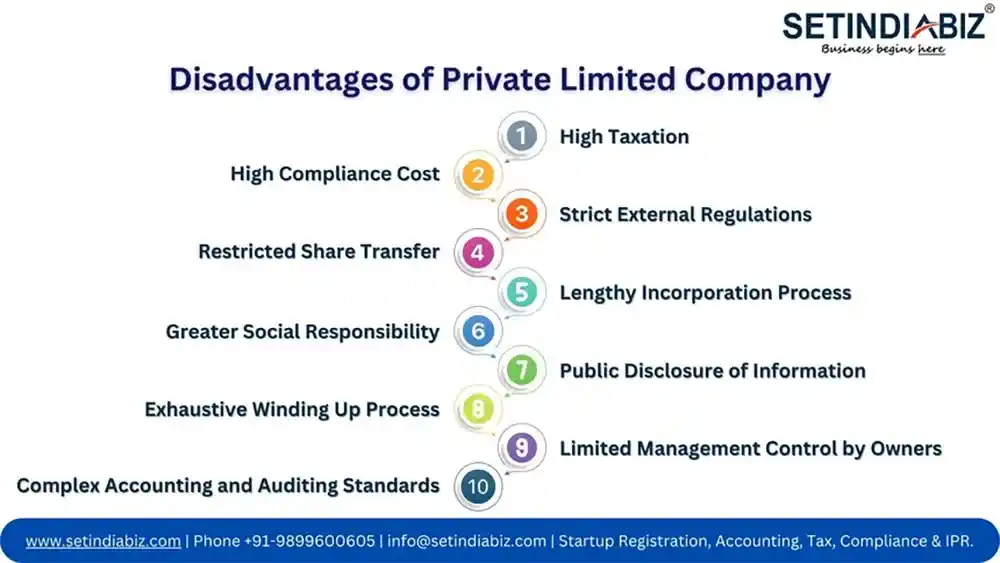Top 10 Disadvantages of Private Limited Company
Although Private Limited Companies are the most popular structural options for Startups, it is necessary to assess its suitability for your business before incorporation. This blog explains the 10 most significant disadvantages of Private Limited Company to give you a clearer and wholesome picture.
A Private Limited company is registered and regulated under the Companies Act of 2013. Its versatility and suitability for a wide range of businesses makes it a popular choice among entrepreneurs. However, like all coins have two sides, even private limited companies have drawbacks and limitations which cannot be ignored while choosing it as a structural option. It is crucial to have a thorough understanding of the disadvantages of Private Limited Company to make an informed decision during the incorporation of your business. We have explained 10 such significant disadvantages in detail below to provide you a deeper insight into what a Private Limited Company structure actually entails.
Private Limited Company Meaning and Key Characteristics
Before understanding the disadvantages of Private Limited Company, it is important to have a clear idea of its structure and key features. As already mentioned earlier, Private Limited Companies are incorporated entities regulated under the Companies Act of 2013. They are co-owned by multiple shareholders, each having a share in the profits according to their shareholding ratio. The liabilities of these shareholders, however, is limited to their subscribed capital only. Here are some of the most common features of a Private Limited Company in India
Key Features of Private Limited Company:
- Distinct Legal Identity
- Mandatory Incorporation
- Restricted Share Transfer
- Limited Liability to Shareholders
- Continued Existence for an Indefinite Period
Top 10 Disadvantages of Private Limited Company
Despite having a wide range of benefits like limited liability, distinct legal identity, and perpetual succession, Private Limited Companies have a few disadvantages one cannot afford to neglect while incorporating their business. For instance, being legally incorporated entities, Private Limited Companies have to fulfil numerous tax and regulatory compliances which increases their overall cost of operations. Additionally, the status of their compliance, along with all other relevant information are publicly available on the MCA website. This results in a complete lack of privacy and secrecy in conducting business operations, which is a huge disadvantage. Likewise, there are other disadvantages of Private Limited Company we have below with detailed explanations.

Public Disclosure of Information
Public disclosure of data and documents is one of the most prominent disadvantages of Private Limited Company as it leads to complete lack of privacy in conducting business operations. The details of the company’s incorporation and compliance status are available for public inspection on the official website of the Ministry of Corporate Affairs. Additionally, on payment of a nominal fee, any person can obtain copies of the company’s incorporation documents from the MCA.
Moreover, every year companies are required to file their annual returns and annual financial statements to the ROC, intimating its current financial and legal status. Even these documents can be accessed by the general public upon payment of minimal fees. Though this enhances transparency in company’s operations which is beneficial for its stakeholders, it eliminates privacy on the part of the company and exposes its strengths and weaknesses to the public.
High Compliance Cost
A Private Limited Company has to fulfil a huge number of compliances not just post-incorporation, but every financial year on a regular basis. For instance, companies are liable to conduct an annual audit of their accounts and file the audited statements to the ROC every year. Along with it, the company has to file other documents to the ROC, like its annual returns and annual directors report every year as well.
Additionally, the Companies Act makes it mandatory for all companies to appoint an auditor every year and intimate such appointment to the ROC by filing ADT-1 form. Also, the director’s need to disclose their interests in the company every year to the ROC. This is just the tip of the iceberg. The tax and regulatory laws of the country place innumerable obligations on a Private Limited Company which raises its cost of operations drastically.
Limited Management Control by Owners
A Private Limited Company is a corporate structure co-owned by multiple shareholders who are not involved in its day-to-day management. The responsibility of controlling the day-to-day management lies on the directors of a company. Besides, the authority to make key decisions are shared among the shareholders in the ratio of their shareholding. This means that every decision of the company would require the consent or agreement of majority shareholders to be executed.
Though most of the decisions of a company can be taken by a simple majority vote of the shareholders, certain critical decisions require passing a special resolution with the consent of at least 75% votes of the shareholders present and voting. Sharing the decision making authority among these many shareholders limits their individual control over the company’s affairs.
Restricted Share Transfer
One of the other major disadvantages of Private Limited Company is the slew of restrictions imposed on its share transfer. A Private Limited Company cannot freely transfer its shares to the general public or trade the same on Stock Exchange platforms. These companies are a closed group of owners, where the shares are mostly held by related or well acquainted individuals. The admission of new shareholders, although permitted, is rarely seen. Even newly issued shares are initially offered to existing shareholders before new investors are approached. In case a transfer of shares is initiated to a new shareholder, the consent of the board of directors, in the form of a resolution passed by a majority of them will be required.
Lengthy Incorporation Process
The incorporation process of a Private Limited Company is quite meticulous and time-consuming endeavour. Unlike other business structures, like sole proprietorships or partnership firms, which can be formed by much simpler and quicker procedures, a Private Limited Company has to go through a legally intricate and exhaustive procedure of incorporation.
This involves filing of a two-part form for registration, preparing a long list of documents, acquiring important prerequisites like Digital Signature and DIN of directors, and fulfilling additional compliance requirements. A Private Limited Company cannot commence its business operations unless it is formally incorporated through this long process.
Exhaustive Winding Up Process
The Disadvantages of Private Limited Company is not only restricted to its incorporation and operational phase, but also extends to the event of its closure. The process of closing an active private limited company is quite legally intricate and takes months to complete. Initially, all the stakeholders of the company are notified of the closure, so that they can be aware of all the liabilities the company owes to them. In the next step, the National Company Law Tribunal (NCLT) assigns an Insolvency Professional to liquidate the company’s assets and settle all its liabilities.
Additionally, various regulatory authorities and the company’s shareholders have to approve the decision to wind it up after setting all the grievances they have with it. Only after the company is clean on all fronts, the procedure to wind it up is executed by the NCLT. Such an exhaustive process of closure can be financially draining for company owners.
High Taxation
Private Limited Companies often face substantial tax burdens due to high corporate tax rates applicable in India. This reduces the company’s disposable income drastically, and limits the scope of its expenses, profit sharing, as well as reinvestment into the business. Additionally, the events of double taxation are also quite frequent, where the same profits are taxed at the corporate level as business income, and at individual level as the personal income of the shareholders after dividend distribution.
High taxation is, however, just one factor of the tax burden. The cost of tax compliance is another. Tax Payments have to be accompanied by subsequent tax returns filing on a regular basis to avoid hefty penalties. Compliance with complex tax regulations, the limited availability of tax deductions, and capital gains tax on the sale of company’s assets or shares further contribute to the elevation of tax burden.
Greater Social Responsibility
Private Limited Companies shoulder a distinctive and substantial social responsibility, stemming from mandatory Corporate Social Responsibility (CSR) provisions imposed by the government. These mandates require companies to allocate a fixed percentage of their profits to CSR activities contributing to social and public welfare. Such contributions usually impact their fiscal stability and growth potential. Compliance and reporting requirements in CSR are rigorous to further increase the burden. While the pursuit of responsible business practices is commendable, these obligations can divert resources and attention away from core business activities of companies.
Strict External Regulations
Private Limited Companies operate within a stringent framework of external regulatory bodies like the Registrar of Companies, the Income Tax Department, the Central Ministry of Corporate Affairs, and the respective State Governments.
These authorities span their norms and regulations across various facets of a company’s formation and operation. These include corporate governance and management, financial reporting, taxation, labour law compliances and industry-specific compliances. Adherence to these norms and regulations places a substantial administrative burden on companies limiting the flexibility of their management.
Complex Accounting and Auditing Standards
Private Limited Companies have to comply with intricate and demanding accounting and auditing standards vital for maintaining financial transparency and regulatory compliance. These standards encompass stringent requirements of reporting income, mandatory annual account audits conducted by certified auditors, compliance with complex accounting principles like GAAP and IFRS, and the necessity to file regular financial reports to the Registrar of Companies. The engagement of certified auditors and the associated audit complexities contribute to substantial audit costs, particularly affecting smaller Private Limited Companies. Errors or inconsistencies in financial reporting can result in penalties, legal consequences, and reputational damage, if neglected.
Company Registration Cost
- Director DIN
- Company Name Approval
- Filing Incorporation Forms
- Company PAN & TAN
- Digital Signature
- Drafting MoA & AoA
- Certificate of Incorporation
- 100% Online Process
Conclusion
Setting up a Private Limited Company in India demands a thorough analysis of not just its advantages but also its disadvantages. The disadvantages of Private Limited Company extends to a challenging incorporation process, exhaustive winding-up process, high taxation, mandatory CSR obligations, and much more. Despite these challenges, Private Limited Companies remain a preferred choice among investors owing to its transparency, credibility, and high growth potential. Hence, the decision to opt for this structure must be driven by the specific needs and objectives of your business.
How can Setindiabiz Help?
At Setindiabiz, we assist Startups and businesses in the incorporation process by providing end-to-end services of documentation, application filing, and regular compliances. We boast a team of excellent Startup Consultants with decades of experience and thousands of satisfied clients. Added to that, is our team of legal professionals providing the much needed guidance and advisories entrepreneurs usually need. If you’re struggling to decide what structure best suits your business, contact us immediately and receive a consultation absolutely free of cost!
FAQ's
1.What are some major disadvantages of Private Limited Company?
2.Can the disadvantages of a Private Limited Company be mitigated or minimised?
3.Is a Private Limited Company the right choice for my business despite its disadvantages?
Author Bio

Editorial Team | in
Setindiabiz Editorial Team is a multidisciplinary collective of Chartered Accountants, Company Secretaries, and Advocates offering authoritative insights on India’s regulatory and business landscape. With decades of experience in compliance, taxation, and advisory, they empower entrepreneurs and enterprises to make informed decisions.

